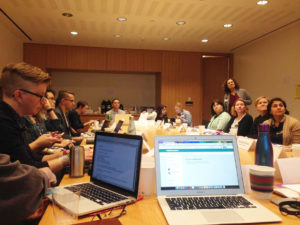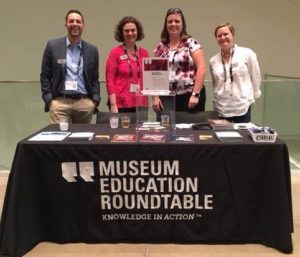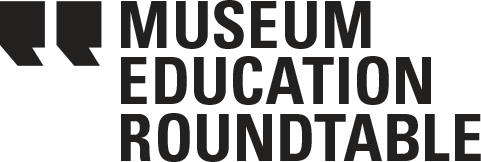To Board or not to Board, that is the question…
As a middle management museum educator, I had no clue what it took to serve on a board, let alone what a board actually did. My experience with boards at that point in my life was entirely on the periphery. To be on a Board of Directors seemed like an elite club to be mysteriously invited into. What I did know at this point in time, was that I was inquisitive, eager to learn more about our field of work. I was also bright-eyed and ambitious to “make a difference” in museum education. So it was by happenstance that I was first exposed to the Museum Education Roundtable (MER) board as an opportunity to join a sub-committee of museum educators gathering data on publications relevant to our work. Little did I know that dipping my toe in the board waters would soon mean fully diving into this unknown world.
As I reflect back on my journey on the MER board, four things come to mind: time, passion, purpose, and perspective. These are all important inputs and outcomes (sorry… I am an evaluator after all!) of the board experience. Here is a closer look at these qualities:
You want me to volunteer my time? What time?

Time. Boards take time and yes, it’s most likely volunteered. I would say you should take stock of what time you have available before embarking on a board journey, but in truth none of us have enough time in our day. The question is more about prioritizing and managing time. A board is only as strong and functional as its members and this requires them to commit time to the work that lies ahead. Board work will ebb and flow, as will the demands on your professional life. Staying on top of those ebbs and flows, stepping up when the work life demand is low and being honest with yourself and the board when the work life demand is too high is essential. My first year on the MER board we knew we had tasks to do but we lacked systems to help organize our time to be efficient and allow people to work around their ebbs and flows. My second year on the board, we set up a system that helped delegate tasks, identify ebbs and flows in the MER work, and allow board members to manage their commitment more realistically.
Why won’t people at work listen to me?
Passion. Yes, museum educators are a passionate bunch. Shocking I know! But not everyone we work with on a daily basis may share the same passion. I recall those days of sitting in a meeting with staff from other departments, trying to get them excited about the new inquiry-based field trip guides we developed only to see lukewarm expressions of interest across the table. It is by no fault of theirs – I similarly do not get excited about the new databases we’re getting to do mass email distributions to members and track their household history of engagement with us (okay, I do actually get excited about anything related to data….). The point is, the MER board was an outlet for my passion, to find like-minded people who were grappling with the same topics as I was. I constantly wanted to push myself and my fellow educators at work forward but there is only so much you can do within the constraints of your organization. The MER board allowed me to funnel my passion toward a broader purpose and to do this with others that shared this same vision for impact. As I joined the MER board, it also transitioned toward embracing the core values we all shared as museum educators and weaving them into our board meetings. Whether it was a close encounter with a sea lion or exploring every nook and cranny of the natural history museum, we allowed ourselves to continue to feed our passion through engaging activities during our board meeting.
What more can we be for the future of museums?

Purpose. This was an underlying theme of much of the work I did on the MER board. As a professional, I decided to join the MER board to give my work purpose beyond the immediate organization I worked for. I wanted to give back to the broader industry of museum education and to help push it forward. At the core of MER is the publication, the Journal of Museum Education. My time on the MER board was one of transition for the journal. We were faced with changing hands for the publication of the journal, not just once but twice. With these transitions came bigger questions of purpose – who was the journal for? What set it apart? What is MER beyond the journal? Should MER be something beyond the journal? How do we bring the museum education community together around the content of the journal? Phew. Heavy duty, purpose-filled work was at knocking at our board door. This can be daunting and exciting at the same time. When I look back now, I am so proud of what we accomplished. We re-focused the journal, created reader guides to facilitate thoughtful reflection and conversation about the content, launched a new brand and website, and much more. All that volunteer time and passion continues to pay off as MER engages museum education practitioners in new and exciting ways.
I have learned a lot… and still have more learning to do
Perspective. Joining the MER board gave me the opportunity both share and gain perspective. At the time I joined the MER board, science education was underrepresented. I was able to represent and promote the inclusion of the science education community in the MER conversation.
Just as I was able to share my perspective, I also gained new perspectives from the amazing members of the MER board. The board members represent an array of content expertise, positions, institutional size, and skill sets. I learned more about our field of work through my fellow board members than I could ever have learned from any museum studies course or textbook. This alone was worth the investment of my volunteered time. I came to that realization when I was confronted with the opportunity to extend my term on the board (which I did by a year!). It was hard to think about letting go of this dynamic group of professionals and the exciting conversations we engaged in.
I won’t lie – board work is not always glamorous and rosy. There are difficult decisions to be made and milestones to achieve. However, the return on investment is high. The input of time, passion, purpose, and perspective resulted in long-lasting relationships with fellow board members, personal professional development and fulfillment, and long-lasting impact for the museum education industry.
Joy Kubarek, PhD, is a Senior Research Associate with PEER Associates, an education research and evaluation consulting firm. Joy has 15 years of experience working in the science education field. She has experience in instruction, leadership, research and evaluation. Joy holds a B.S. in Biology, a M.Ed. with a focus on environmental education, and a Ph.D. in Science Education from the Illinois Institute of Technology. She has conducted scientific field research and led research expeditions but the bulk of her career has focused on research and evaluation of science education. She founded the Learning Planning & Evaluation department at Shedd Aquarium in Chicago and later moved on to become Vice President of Learning at the aquarium, strategically guiding both the programmatic and evaluation functions of education at the aquarium. Joy served on the MER Board of Directors from 2011-2015.
Contact Joy at joy.kubarek (at) gmail (dot) com or joy (at) peerassociates (dot) net.

